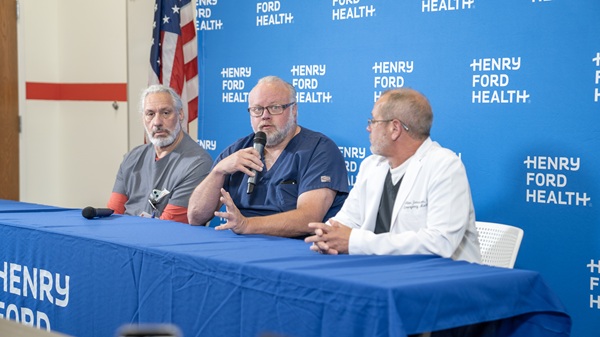Prepared for the Unthinkable, Henry Ford Genesys Hospital Emergency Staff United in Crisis

GRAND BLANC TOWNSHIP, Mich. — Three days after a mass shooting devastated the Grand Blanc community, three emergency physicians from Henry Ford Genesys Hospital reflected on how their teams mobilized to respond to a tragedy in their own community.
During a press conference on Wednesday, Dr. Alan Janssen, medical director of emergency medicine, described how the hospital’s care team swiftly turned chaos into a coordinated response following Sunday’s attack at the nearby Church of Jesus Christ of Latter-day Saints.
“Emergency medicine is a team sport,” Janssen said. “You need the entire team to be engaged. Everybody has to be on the same page, and I’m not talking about just the emergency department. I am talking about everyone, from EMS, to the fire department, to your police, to your registration (personnel), to all your techs in the department, to your nurses – and we had some outstanding nurses that day especially.
“The entire group has to work as one to be successful. I couldn’t be prouder of our community and our hospital in making it happen that day.”
A beautiful late-summer Sunday morning in Michigan is usually as quiet as it gets in an emergency department, Janssen said. But that calm was shattered at about 11 a.m. when Janssen got a call from a colleague who had been at the church service.
Janssen immediately alerted staff to prepare for mass casualties. His first call was to Dr. Christopher Ash, a longtime trauma surgeon and medical director of surgical services at Henry Ford Genesys Hospital.
What Ash encountered in the emergency department that day was unlike anything he had seen in more than 25 years serving Genesee County, he said.
“All of these patients just started rolling through the door, one after another, with wounds that you just never see in Grand Blanc, Michigan,” Ash said. “It was really all hands on deck. The team did an amazing job helping us to prioritize the care and deliver the care to do our best to keep everybody alive.”
In all, eight patients between the ages of 6 and 78 were admitted to Henry Ford Genesys Hospital after the attack, including some who were relatives or co-workers of hospital staff.
While the team is trained to handle trauma, the emotional toll ran deeper this time, said Dr. Sanford Ross, assistant director of the emergency department.
“We were treating our own, which is always a little harder,” Ross said. “We always are invested in any of the patients that come in. But when you spend day after day with that person and then they come in as a trauma, or their family does, I think it hits you just a little different.”
Janssen credited recent mass casualty training with helping the team act decisively. Critical patients were routed immediately, trauma bays turned over quickly and logistics managed seamlessly.
Amid the urgency, there were also quiet moments of compassion.
“You try to level set with that individual, you talk on their level as best you can,” Janssen said. “You show them kindness and caring, and that they’re safe.”
Support poured in from across Henry Ford Health, with surgeons across the region calling to assist. Three heart surgeons traveled from the Detroit area to offer help.
Despite all efforts, one patient died in the hospital from gunshot wounds. For Ash, the loss weighed heavily.
“I feel bad that we didn’t have the miracle to be able to save them,” Ash said. “I think that’s part of the struggle people in medicine have — we can’t save everybody, but I think the world kind of expects that we should be able to.
“This is deeply personal to our community, not just our hospital. These are our people. It’s heartbreaking, and words can’t describe the feeling. We shouldn’t have to go through this in any community.”
Still, the doctors emphasized that when the unimaginable happened, their teams rose to the moment.
“Our teams were amazing, and the work became almost automatic,” Ash said. “All for one, and all on board at the same time.”
###
MEDIA INQUIRIES: mediarelations@hfhs.org
.svg?iar=0&hash=F6049510E33E4E6D8196C26CCC0A64A4)

/hfh-logo-main--white.svg?iar=0&hash=ED491CBFADFB7670FAE94559C98D7798)









